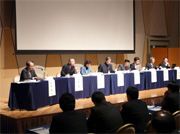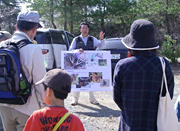Global
Change
Breadcumbs
- Home
- Sustainability
- Environment
- Communication
- Sustainable Environmental Management Network
Share
Main content
The proposals resulting from Japan-CLP are scheduled to be officially announced in March 2010.
Senior Specialist (in charge of environment, safety and sanitation/TPM) Tetsuo Ito At the request of Fukui Prefecture and Sakai City, where Ricoh’s Fukui Plant is located, the plant has been cooperating with the environmental promotion activities of the local governments. In 2007 and 2008, I served as the head of Sakai City’s committee for drafting an environmental action plan and took on the immense challenge of summarizing the opinion of citizens, the local administration, and environmental experts. Day after day, after work, I conducted hearings attended by many stakeholders including Sakai residents and corporations to hear a wide range of opinions on the challenges and problems related to regional environmental preservation. At the end, we were able to draft Sakai City’s basic environmental plan for the next ten years. I was very happy because I was able to use the experience and knowledge I gained as the officer in charge of the environment at the Fukui Plant to contribute to local policy and assist the community. I also appreciate from the bottom of my heart the understanding and support I received from my colleagues as well as Ricoh for acknowledging my work through the Minori Award.
I believe that the company trained me to become the person I am today. I gained from Ricoh everything I do now including learning about the environment and communicating with people. My actions are based on giving back to the community what I learned from Ricoh and giving back to the company what I gained from the community. These past few years, we have been conducting the “Family Strategy to Prevent Global Warming” within the Fukui Plant. Each household can save energy just by being slightly more environmentally conscious. Therefore, we ask not only our employees but also their parents and children as well to be more considerate of the environment in their daily lives, and to monitor their electricity consumption to see if those efforts produce results. In the first year, every household is motivated because their electricity bills are reduced. After three years, these energy-saving measures become a habit, and participants begin to think spontaneously about their environmental impact. This is the goal of this strategy.
I can understand the feelings of people who aren’t interested in environmental activities because I was once like that. Communication is a cycle of asking, cooperating, explaining and understanding. Each environmental activity can be cumbersome. But we have reached a point where we have to conduct these cumbersome things together or else we will not make it in time to save the earth. I am not an expert on ants, but even in the world of ants, we see everyone working together toward one goal and taking on individual roles to achieve the group’s goal. If we humans are to meet environmental goals set for 2020 and 2050, we have no choice but to communicate with each other and take action seriously. Tetsuo Ito’s main community activities 2008 to present Fukui Prefecture committee for promoting and preparing action plans for natural regeneration 2005 to present Committee for managing the Fukui City Museum of Natural History
Instructor for nature observation sessions for members of the public 2008 to present Sakai City waste reduction promotion and deliberation committee 2007 to 2008 Chairman, Sakai City environmental action plan drafting committee 2006 to 2008 Fukui Prefecture committee for promoting the prevention of global warming 2004 to 2006 Member of Fukui Prefecture’s project to boost environmental protection In addition, he has given lectures at corporations, universities and in the community concerning nature and the environment; nature classes and nature observation sessions for students and the general public; sessions for creating biotopes, etc.
Sustainable Environmental Management Network
To be a going concern whose growth and development is desired by society, promoting environmental conservation activities alone is not enough. We have to make efforts to inform as many people as possible of our philosophy and activities so that we may win public trust and confidence. The active disclosure of information to internal and external stakeholders will contribute to the further activation of activities and the creation of a resource-recirculating society. With the firm belief that environmental communication and conservation activities are the two wheels of sustainable environmental management, the Ricoh Group is expanding its network of the conservation activities through the promotion of communication in good faith.
Japan-CLP Symposium 2009
Participation in Japan-CLP (Ricoh/Japan)
Considering the Gravity of Climate Change and Realizing Economic Growth through Low-Carbon Technology



(Ricoh/Japan)

The proposals resulting from Japan-CLP are scheduled to be officially announced in March 2010.
Employee Interview
Giving back to the community what we learned at the company We feel the importance of environmental communication every day
Receiving the Minori Award * for contribution to local and administrative environmental activities
Using the knowledge and experience from working with insects to develop an original environmental message
Communication is a cycle of asking, cooperating, explaining and understanding



(Ricoh/Japan)

Senior Specialist (in charge of environment, safety and sanitation/TPM) Tetsuo Ito At the request of Fukui Prefecture and Sakai City, where Ricoh’s Fukui Plant is located, the plant has been cooperating with the environmental promotion activities of the local governments. In 2007 and 2008, I served as the head of Sakai City’s committee for drafting an environmental action plan and took on the immense challenge of summarizing the opinion of citizens, the local administration, and environmental experts. Day after day, after work, I conducted hearings attended by many stakeholders including Sakai residents and corporations to hear a wide range of opinions on the challenges and problems related to regional environmental preservation. At the end, we were able to draft Sakai City’s basic environmental plan for the next ten years. I was very happy because I was able to use the experience and knowledge I gained as the officer in charge of the environment at the Fukui Plant to contribute to local policy and assist the community. I also appreciate from the bottom of my heart the understanding and support I received from my colleagues as well as Ricoh for acknowledging my work through the Minori Award.
- * Ricoh Group President’s Award

I believe that the company trained me to become the person I am today. I gained from Ricoh everything I do now including learning about the environment and communicating with people. My actions are based on giving back to the community what I learned from Ricoh and giving back to the company what I gained from the community. These past few years, we have been conducting the “Family Strategy to Prevent Global Warming” within the Fukui Plant. Each household can save energy just by being slightly more environmentally conscious. Therefore, we ask not only our employees but also their parents and children as well to be more considerate of the environment in their daily lives, and to monitor their electricity consumption to see if those efforts produce results. In the first year, every household is motivated because their electricity bills are reduced. After three years, these energy-saving measures become a habit, and participants begin to think spontaneously about their environmental impact. This is the goal of this strategy.
I can understand the feelings of people who aren’t interested in environmental activities because I was once like that. Communication is a cycle of asking, cooperating, explaining and understanding. Each environmental activity can be cumbersome. But we have reached a point where we have to conduct these cumbersome things together or else we will not make it in time to save the earth. I am not an expert on ants, but even in the world of ants, we see everyone working together toward one goal and taking on individual roles to achieve the group’s goal. If we humans are to meet environmental goals set for 2020 and 2050, we have no choice but to communicate with each other and take action seriously. Tetsuo Ito’s main community activities 2008 to present Fukui Prefecture committee for promoting and preparing action plans for natural regeneration 2005 to present Committee for managing the Fukui City Museum of Natural History
Instructor for nature observation sessions for members of the public 2008 to present Sakai City waste reduction promotion and deliberation committee 2007 to 2008 Chairman, Sakai City environmental action plan drafting committee 2006 to 2008 Fukui Prefecture committee for promoting the prevention of global warming 2004 to 2006 Member of Fukui Prefecture’s project to boost environmental protection In addition, he has given lectures at corporations, universities and in the community concerning nature and the environment; nature classes and nature observation sessions for students and the general public; sessions for creating biotopes, etc.
